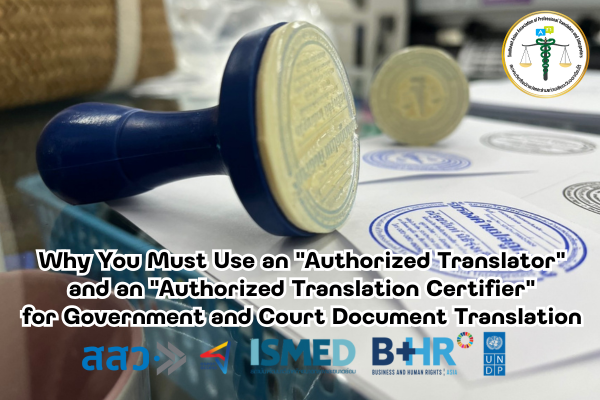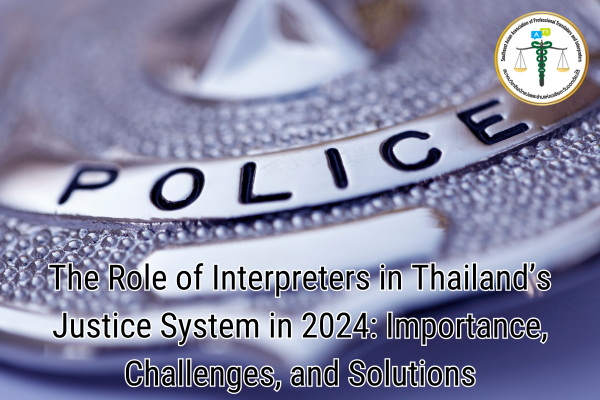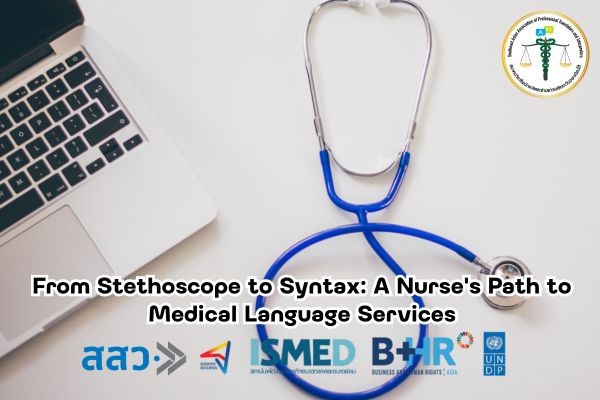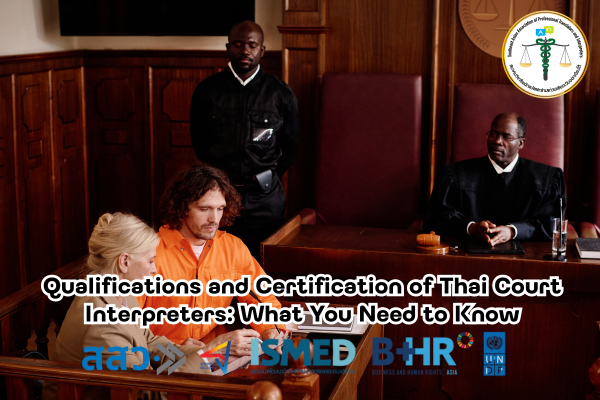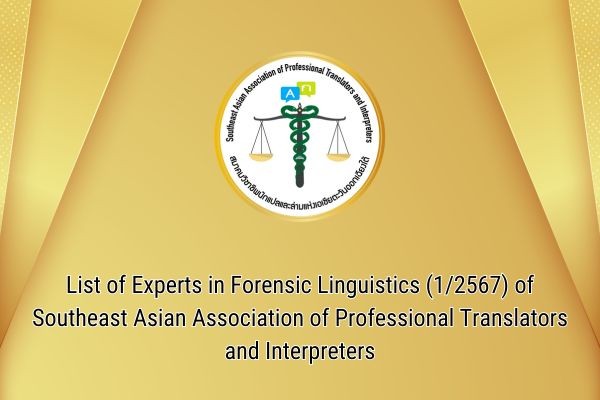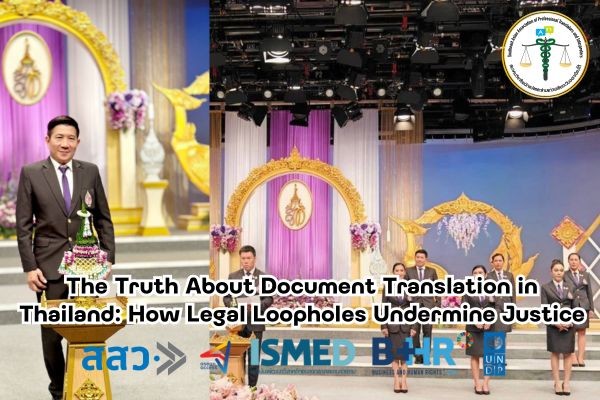Why You Must Use an “Authorized Translator” and an “Authorized Translation Certifier”
for Government and Court Document Translation
Bangkok, 28 April 2025 – Choosing the wrong person to translate your government or court documents can lead to serious, avoidable consequences. Simply selecting an authorized translator can make all the difference. Here’s why it matters more than you think.
Definitions:
Authorized Translator: A person properly qualified and legally empowered under regulations to translate official documents.
Authorized Translation Certifier: A person who can certify the accuracy of translated documents for use in government agencies, courts, or administrative bodies.
Examples of Authority:
- License or permit issued by a government authority
- Certification from a professional association, such as the Southeast Asian Association of Professional Translators and Interpreters (SEAProTI)
Problems Caused by Using “Unauthorized Translators” and “Unauthorized Certifiers”
Despite clear legal requirements, unauthorized translation and certification remain widespread problem in Thailand. Over 90% of government and court document translations on the market are performed by individuals without proper authorization.
The risks include:
- Documents being rejected by courts or government agencies
- Loss of legal rights, such as losing a lawsuit or visa denial
- Wasting time and money to retranslate documents
- Potential legal liability if inaccurate information causes harm
The Thai Legal System: “Complaint-Based” Enforcement
Thailand’s legal system often operates on a complaint-based mechanism. Even though unauthorized translation and certification are illegal, no action is taken unless a formal complaint is filed. Thus, if no apparent damage or no aggrieved party is reporting the issue, unauthorized translators continue to operate without legal consequences.
Why Are Authorized Professionals Required for
Government and Court Document Translation
1. To Ensure Legal Validity
-
- Using an authorized translator and certifier grants your translated document immediate legal recognition, critical for:
- Court submissions
- Ministry or embassy applications
- Official transactions requiring certified documentation
- Using an authorized translator and certifier grants your translated document immediate legal recognition, critical for:
2. To Guarantee Accuracy and Prevent Errors
- Authorized translators undergo professional training and skills assessments, covering:
- Legal terminology translation
- Formal language usage
- Translation ethics
3. To Protect Your Rights and Interests
- Errors in translating government and court documents can result in:
- Loss of rights in litigation
- Missed business opportunities
- Reputational damage
Choosing an authorized translator is proactive protection.
Why Government Agencies Sometimes Accept Unauthorized Translations
Although many agencies are aware that translations must come from authorized certifiers, in practice, they sometimes accept unauthorized translations due to:
- Convenience due to the lack of qualified translators and translation certification providers in the area
- Reciprocal interests
- Possible corruption
Common examples:
- Lawyers translating and certifying their documents to influence case outcomes
- Agencies accepting translations without checking credentials
Impact:
Such practices could expose the agencies themselves to liability for dereliction of duty.
How to Choose an “Authorized Translator” and “Authorized Translation Certification Provider”
Checklist:
- Request proof of authority (license, certificate from relevant bodies)
- Verify certification with a reputable professional association (e.g., SEAProTI)
- Check work history and ask for client references
- Prioritize reputable service providers over low-cost offers
Final Word: Only Use Authorized Professionals for
- Government and Court Document Translations!
- Using an authorized translator and authorized certifier isn’t just about accuracy — it’s about safeguarding your rights and minimizing future legal risks.
- Don’t gamble with critical documents.
- Always choose properly certified, authorized translators!
* Proposal to Amend the Ministerial Regulation on Certified Translations under the Administrative Procedure Act B.E. 2539 (1996) (Read more)
** The Role of Professional Associations in Proposing Amendments to Ministerial Regulations under the Administrative Procedure Act B.E. 2539 (1996) (Read more)
SEAProTI’s certified translators, translation certification providers, and certified interpreters:
The Southeast Asian Association of Professional Translators and Interpreters (SEAProTI) has officially announced the criteria and qualifications for individuals to register as “Certified Translators,” “Translation Certification Providers,” and “Certified Interpreters” under the association’s regulations. These guidelines are detailed in Sections 9 and 10 of the Royal Thai Government Gazette, issued by the Secretariat of the Cabinet under the Office of the Prime Minister of the Kingdom of Thailand, dated July 25, 2024, Volume 141, Part 66 Ng, Page 100.
To read the full publication, visit: the Royal Thai Government Gazette
ทำไมต้องใช้ “นักแปลที่มีอำนาจแปล” และ “ผู้รับรองการแปลที่มีอำนาจรับรองการแปล”
ในการแปลเอกสารราชการและเอกสารศาล
28 เมษายน 2568, กรุงเทพมหานคร – แปลเอกสารราชการหรือเอกสารศาลผิดคน อาจหมายถึงความเสียหายใหญ่หลวงที่หลีกเลี่ยงได้แค่เลือกนักแปลที่มีอำนาจ! มาดูกันว่าทำไมสิ่งนี้จึงสำคัญยิ่งกว่าที่คุณคิด
ความหมายของ “นักแปลที่มีอำนาจแปล” และ “ผู้รับรองการแปลที่มีอำนาจรับรองการแปล”
ก่อนอื่นเราต้องเข้าใจว่า:
- นักแปลที่มีอำนาจแปล คือผู้ที่มีคุณสมบัติและอำนาจตามกฎหมายหรือระเบียบอย่างถูกต้องในการแปลเอกสารสำคัญ
- ผู้รับรองการแปลที่มีอำนาจรับรองการแปล คือผู้ที่มีสิทธิ์รับรองความถูกต้องของเอกสารแปลเพื่อใช้ในราชการ ศาล หรือหน่วยงานทางการปกครอง
ตัวอย่างการรับรองอำนาจ:
- ใบอนุญาตจากหน่วยงานราชการ
- การรับรองจากสมาคมวิชาชีพ เช่น สมาคมวิชาชีพนักแปลและล่ามแห่งเอเชียตะวันออกเฉียงใต้ (SEAProTI)
ปัญหาที่เกิดจากการใช้ “นักแปลไม่มีอำนาจ” และ “ผู้รับรองการแปลที่ไม่มีอำนาจ”
การแปลเอกสาร และ การรับรองการแปล โดยผู้ไม่มีอำนาจกลายเป็นปัญหาเรื้อรังในประเทศไทย แม้กฎหมายจะกำหนดหลักเกณฑ์ไว้ชัดเจน แต่ปัญหานี้กลับยังคงเกิดขึ้นอย่างกว้างขวาง ทำไมจึงเป็นเช่นนั้น และจะป้องกันตัวเองจากความเสี่ยงได้อย่างไร หลายคนไม่ทราบว่าในประเทศไทย กว่า 90% ของการแปลเอกสารราชการและเอกสารศาลในท้องตลาด เกิดขึ้นโดยผู้ไม่มีอำนาจแปลหรือไม่มีอำนาจรับรองการแปลอย่างถูกต้อง
ความเสี่ยงที่ตามมา ได้แก่:
- เอกสารถูกปฏิเสธโดยศาลหรือหน่วยงานราชการ
- สูญเสียสิทธิ์ทางกฎหมาย เช่น แพ้คดีหรือเสียสิทธิ์การขอวีซ่า
- ต้องเสียเงินและเวลาในการแปลเอกสารใหม่
- เสี่ยงคดีความเพิ่มเติมหากข้อมูลผิดพลาด
ระบบกฎหมายไทย: “ร้องทุกข์กล่าวโทษ” เป็นหลัก
ระบบกฎหมายไทยในหลายกรณี ใช้หลัก “ร้องทุกข์กล่าวโทษ” แม้การแปลหรือรับรองการแปลโดยไม่มีอำนาจจะผิดกฎหมายแต่ จะไม่มีการดำเนินคดี หากไม่มีผู้ร้องทุกข์หรือแจ้งความ ดังนั้น หากไม่มีผู้เสียหายที่ร้องเรียน นักแปลที่ไม่มีอำนาจก็สามารถดำเนินการได้โดยไม่ถูกดำเนินคดีในทางปฏิบัติ
เมื่อไม่เกิดความเสียหาย = ไม่มีผู้ร้องทุกข์
แม้ว่าประมาณ 90% ของนักแปลที่รับแปลเอกสารในประเทศไทยจะ ไม่มีอำนาจในการแปลหรือรับรองการแปล ตามกฎหมาย แต่ถ้าเอกสารนั้นไม่ก่อให้เกิดความเสียหาย เช่น ไม่ถูกปฏิเสธโดยหน่วยงานราชการ หรือไม่ใช้ในคดีความที่เกิดความเสียหายต่อชีวิตและทรัพย์สินของผู้อื่น ผู้เสียหายมักไม่ดำเนินการร้องทุกข์ ทำให้ปัญหายังคงอยู่
ทำไม “การแปลเอกสารราชการ” และ “การแปลเอกสารศาล” ต้องใช้ผู้มีอำนาจ
1. เพื่อให้เอกสารแปลถูกต้องตามกฎหมาย
การใช้ นักแปลที่มีอำนาจแปล และ ผู้รับรองการแปลที่มีอำนาจรับรองการแปล ช่วยให้เอกสารแปลของคุณมีสถานะ “ถูกต้องตามกฎหมาย” ทันที ซึ่งสำคัญอย่างยิ่งสำหรับ:
- การยื่นเอกสารในศาล
- การยื่นเอกสารต่อกระทรวงหรือสถานทูต
- การทำธุรกรรมที่ต้องการเอกสารทางการ
2. เพื่อความแม่นยำและป้องกันข้อผิดพลาด
ผู้ที่มีอำนาจแปลมักได้รับการฝึกฝนทางวิชาชีพและผ่านการสอบประเมินทักษะตามมาตรฐาน เช่น ทักษะการแปลศัพท์กฎหมาย การใช้ภาษาอย่างเป็นทางการ และจรรยาบรรณการแปล
3. เพื่อปกป้องสิทธิ์และผลประโยชน์ของคุณ
การแปลเอกสารราชการและเอกสารศาลผิดพลาดอาจนำไปสู่:
- สูญเสียสิทธิในคดี
- ขาดโอกาสทางธุรกิจ
- เสียชื่อเสียง
การเลือกนักแปลที่มีอำนาจคือการป้องกันปัญหาเหล่านี้ตั้งแต่ต้น
หน่วยงานราชการรับเอกสารแปลจากผู้ไม่มีอำนาจ เพราะอะไร
แม้หน่วยงานราชการจำนวนมากจะรู้ว่าการแปลเอกสารสำคัญต้องมาจาก นักแปลที่มีอำนาจรับรองการแปล ตามกฎหมาย
แต่ในทางปฏิบัติกลับ:
- ยอมรับการแปลจากบุคคลที่ไม่มีอำนาจ
- อาจเกิดจากผลประโยชน์ต่างตอบแทน ความสะดวก หรือการทุจริต
ตัวอย่างที่พบได้บ่อย:
- ทนายความแปลเอกสารเองและรับรองการแปลเอง เพื่อหวังผลทางคดี
- หน่วยงานรัฐรับเอกสารแปลโดยไม่ตรวจสอบใบอนุญาตหรือคุณสมบัติของนักแปล
ผลกระทบ: หน่วยงานดังกล่าวอาจถือว่ามีความผิดร่วมในฐานะละเว้นการปฏิบัติหน้าที่ตามกฎหมาย
วิธีเลือก “นักแปลที่มีอำนาจ” และ “ผู้รับรองการแปลที่มีอำนาจ”
ตรวจสอบดังนี้:
- ขอเอกสารแสดงอำนาจ เช่น ใบอนุญาต หรือใบรับรองจากหน่วยงานที่เกี่ยวข้อง
- สอบถามแหล่งรับรอง เช่น สมาคมวิชาชีพนักแปลที่เชื่อถือได้ (เช่น SEAProTI)
- ตรวจสอบประวัติการทำงาน หรือขอข้อมูลอ้างอิงจากลูกค้ารายเก่า
- เลือกผู้ให้บริการที่มีชื่อเสียงในวงการ ไม่ใช่แค่ราคาถูก
สรุป: แปลเอกสารราชการและเอกสารศาล ต้องใช้ “นักแปลที่มีอำนาจ” เท่านั้น!
การใช้ นักแปลที่มีอำนาจแปล และ ผู้รับรองการแปลที่มีอำนาจรับรองการแปล ไม่ใช่แค่เรื่องของความถูกต้องเท่านั้น แต่ยังเป็นเรื่องของการปกป้องสิทธิ์ของคุณ และลดความเสี่ยงทางกฎหมายที่อาจเกิดขึ้นในอนาคต
อย่าเสี่ยงกับเอกสารสำคัญของคุณ เลือกนักแปลที่ผ่านการรับรองและมีอำนาจถูกต้องเสมอ!
* ข้อเสนอแนะแนวทางแก้ไขเพิ่มเติมกฎกระทรวง ว่าด้วยการรับรองการแปลออกตามความในพระราชบัญญัติวิธีปฏิบัติราชการทางปกครอง พ.ศ. 2539 แก้ไขเพิ่มเติม ให้มี (5) ของข้อ 1 แห่งกฎกระทรวง (พ.ศ. 2540) (อ่านเพิ่มเติม)
** บทบาทของสมาคมวิชาชีพในการเสนอแก้ไขกฎกระทรวงตามพระราชบัญญัติวิธีปฏิบัติราชการทางปกครอง พ.ศ. 2539 (อ่านเพิ่มเติม)
เกี่ยวกับนักแปลรับรอง ผู้รับรองการแปล และล่ามรับรองของสมาคมวิชาชีพนักแปลและล่ามแห่งเอเชียตะวันออกเฉียงใต้
สมาคมวิชาชีพนักแปลและล่ามแห่งเอเชียตะวันออกเฉียงใต้ (SEAProTI) ได้ประกาศหลักเกณฑ์และคุณสมบัติผู้ที่ขึ้นทะเบียนเป็น “นักแปลรับรอง (Certified Translators) และผู้รับรองการแปล (Translation Certification Providers) และล่ามรับรอง (Certified Interpreters)” ของสมาคม หมวดที่ 9 และหมวดที่ 10 ในราชกิจจานุเบกษา ของสำนักเลขาธิการคณะรัฐมนตรี ในสำนักนายกรัฐมนตรี แห่งราชอาณาจักรไทย ลงวันที่ 25 ก.ค. 2567 เล่มที่ 141 ตอนที่ 66 ง หน้า 100 อ่านฉบับเต็มได้ที่: นักแปลรับรอง ผู้รับรองการแปล และล่ามรับรอง


